Chapter 2.3 Mark Twain
Textbook Questions and Answers
Warming up!
Chit-chat:
- Who is your favourite comedian?
- What do you like better – to listen to a joke, or to tell a joke?
- Do you like cartoons and cartoon films?
- Which one do you like best?
Quick Thinkers:
Within one minute, write as many meaningful phrases as possible using the numbers given below. Do not repeat the ideas.
Question 1.
Within one minute, write as many meaningful phrases as possible using the numbers given below. Do not repeat the ideas.
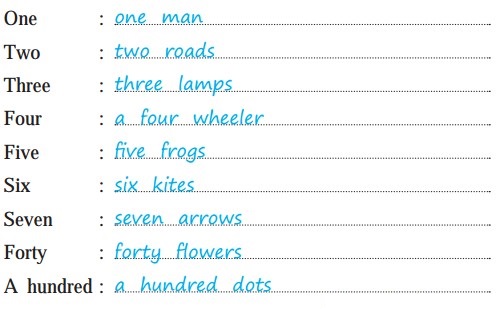
Answer:
- One – one boy
- Two – two girls
- Three – three facebook accounts
- Four – four complaints
- Five – five gardens
- Six – six policemen
- Seven – seven roads
- Forty – forty feet
- A hundred – a hundred messages
Try to imagine a situation context where all the above items fit in. Describe it in 8 – 10 lines.
Think of a title for your passage.
Question 1.
Try to imagine a situation context where all the above items fit in. Describe it in 8 – 10 lines. Think of a title for your passage.
Answer:
Tit for tat
There was a boy in one city. He was studying in standard nine. He opened three fake Facebook accounts and started sending indecent messages to two girls from his class. The girls complained to their teacher four times but he continued sending ‘the same kinds of messages.
At last, the girls’ parents complained to Five gardens police station. Six policemen from the police station came to his school and took the boy to a remand home where seven roads meet. Now the boy is in a forty feet room and taking his punishment for sending hundreds of – indecent messages to the innocent girls.
Try to draw a map incorporating your phrases in a meaningful way. (Two examples are given below.) Write a key/index for your map.
Question 1.
Try to draw a map incorporating your phrases in a meaningful way. (Two examples are given below.) Write a key/index for your map.
Answer:
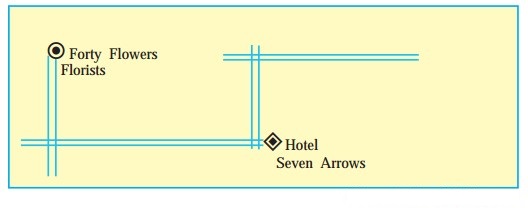
English Workshop:
1. Answer the following questions:
Question a.
Did Twain tell the barber who he was?
Answer:
Twain did not tell the barber who he was because he didn’t want to disclose his identity. But he told him that it was his first visit to that town.
Question b.
Was Twain particular about how he dressed when he was visiting friends?
Answer:
Yes, Twain was particular about his dress because when Mrs. Stowe saw him without any collar and tie she was surprised. She disapproved his dressing, it shows that he was always in formal, particular dress.
Question c.
Was Twain particular about what words he used?
Answer:
Yes, Twain was very much particular about what words he used.
Question d.
Do you think Twain approved of spelling reforms? Give reasons for your answer.
Answer:
Twain proposed a different plan for the improvement of English spellings. He wanted to convey that further changes and reformation in English spellings would be harmful for the language. So I think he did not approve of spelling reforms.
Question e.
How did Twain explain the spider in the paper? What did he want to highlight?
Answer:
Twain explained that the spider was on the paper to see which merchant was not advertising, so that he could go to that store; spin his web across the door and lead a life of undisturbed peace afterwards. He wanted to highlight that there was no logical reason behind superstitions as the spider just happened to be there on the newspaper by chance. He also wanted to highlight that we should not believe in superstitions.
2. Read the following and write the two meanings of ‘mind’ and ‘matter’ :
‘Age is an issue of mind over matter. If you don’t mind, it doesn’t matter.’
Question 1.
Read the following and write the two meanings of ‘mind’ and ‘matter’.
Age is an issue of mind over matter. If you don’t mind, it doesn’t matter.
Answer:
Here mind and matter both are used as a nouns first and then they are used as verbs.
3. Enact any one anecdote in the classroom.
Question 1.
Enact any one anecdote in the classroom.
4. Translate any five of the quotations you like.
Question 1.
Translate any five of the quotations you like.
5. Form groups of four to six.
Discuss whether and how you can improve English spelling.
Question 1.
Discuss whether and how you can improve English spelling.
6. Arrange a ‘Jokes’ session in the classroom where each student tells a joke. The jokes must be told in English.
Question 1.
Arrange a ‘Jokes’ session in the classroom where each student tells a joke. The jokes must be told in English.
Language Study:
7. Many actions involve two people/things – one that performs the action and one that is affected by the action. Example: Sonali ate the mango.
Here, the action of eating involves Sonali (who eats) and the mango (which gets eaten).
Sonali is the subject and ‘mango’ is the object of the verb ‘eat’. When you want to talk about who performed the action, the doer of the action is the subject.
Sometimes, you want focus on the object – the thing affected by the action. Then you make it the subject of that sentence. Example: The mango was eaten.
You may or may not mention the doer – here, Sonali or the person who ate it.
This is passive construction or passive voice. In this type of construction, the thing affected by the verb is the subject of the sentence, the verb is in the passive form (be + past participle), and the ‘doer’ of the action may or may not be mentioned.
In the following examples of passive voice, the ‘doer’ of action is not mentioned.
Examples :
- The plants are pruned.
- A cup of tea is offered to any guest …
- Many anecdotes related to Mark Twain are told …
If we wish to mention the ‘doer’ in passive sentences, we mention it by adding ‘by’
before it. Examples :
This pen was given to me by my Aunt.
Note that only transitive verbs can be used in the passive voice.
8. Refer to the Language Study pages and read the entries ‘irony’ and ‘pun’. Find one example of each from the passage or the quotations.
Question 1.
Find the examples of ‘irony’ and ‘pun’ from the lesson or the quotations.
Answer:
irony – use of words to imply the opposite of what they mean.
Examples:
- A writer is working on his manuscript; and it’s a comedy.
- ‘classic’ – A book which people praise and don’t read.
pun – a play on words based on their different meanings, for a humorous effect.
Examples:
- A bicycle can’t stand on its own because it is two-tired.
- Age is an issue of mind over matter. If you don’t mind, it doesn’t matter.
(2 examples of irony and pun are given here. Students are expected to find more examples from the lesson.)
8. Activity: Live English: Customer Care
Question a.
Read the following conversation.
Answer:
- Vaishali: Mother, how’s your new Zap3 mobile working?
- Mother: Oh It’s a fantastic piece and I’ve got a Bhramar simcard free with this mobile but somehow the Internet Is not working.
- Vaishali: Go to the settings and see if the mobile data is switched on.
- Mother: Yes, dear, I’ve done that so many times, but still I am not getting connected.
- Vaishali: Let’s contact the customer support at Bhramar and take their help. Look, the number Is given on the back of the simcard packet.
- Mother: Yes. I’ll contact them immediately.
-
Vaishali: Put your mobile on speaker phone so that I can guide you.
(Mother dials Bhramar Telecom customer care.) -
Bhramar CC: Hello. This is Bhramar customer care service. For information in English, press for Hindi, press 2, for Marathi, press 3, to talk to our customer care executive, press 4.
(Mother presses 1.) -
Bhramar CC: For information regarding bills and your account, press 1 for internet queries and offers, press 2 for other services, press 3 to talk to our customer care executive, press 4.
(Mother presses 2.) -
Bhramar CC: For different Internet plans, press: 1 to talk to our customer care executive, press 2.
(Mother presses 2.) - Bhramar CC: How can I help you?
- Mother: I bought a new Bhramar SIM yesterday. I have opted for the 349 rupees unlimited plan.
- Bhramar CC: Yes, it Is reflected against your number.
- Mother: But I am not getting connected to the Internet.
- Bhramar CC: Go to Settings’ and in APN type internet and save it. After that just switch off the phone and then switch it on again. The internet will start working. Any other queries, Madam?
- Mother: No, thank you. If I have any problem, I will call you back.
- Bhramar CC: Thanks for calling Bhramar Customer Care service. (Hangs up.)
- Vaishali: See, Mummy, It’s quiet simple.
Question b.
You have purchased some games CDs online through ChalaShikuya. corn (CSY). You are not able to access the CD. It is published by Cithuttigarnes. When you contact the customer care service of Chhuttigarnes. what questions will you ask?
Answer:
Questions to ask chalashikuya.com. customer care service of chhuttigames.
- Is it customer care service of chhuttigames?
- I want to talk to the person who deals with customer complaints, who is the right ¡erson to talk to?
- Recently I have purchased some games CD online through your website. It’s not working properly. How can I resolve my problem?
- Is it possible to exchange the CD?
- How can I send it back to you?
- How much time will you take to replace it?
- What is the guarantee that new CD wifi work properly?
- Will you return the money which I paid for CDs?
Question c.
Find out who the service provider is for your parents mobile. With your parents’ pennission. call the customer care service to get information regarding the active plans on your number. (For example. SMS plan, internet plan, etc. and share this information in your classroom.)
Answer:
Telephonic conversation with the customer care service.
- Myself: Hello, is it Airtel Service Centre?
- ServIceman: Yes, what can I do you for you, Sir?
- Myself: My mother’s number is 9867XXXX10 and I want to enquire about new plans for this number.
- Serviceman: Could you hold on for a moment please? I will just put you through to our expert.
- Myself: It’s all right.
- Serviceman: What do you want to ask, Sir? I can’t get through to him at the moment. If you tell me, I wifi definitely pass on your message to him.
- Myself: I want to ask about the active plan on my mobile. Especially about SMS plan and Internet plan.
- Serviceman: I think the operator has hung up. I will pass on your message to him, call you back in some time.
- Myself: 0k Sir, Thanks a lot!
- Serviceman: Welcome Sir, Have a good day.
Question d.
Prepare simple telephone conversations using the expressions below.
Some useful ‘telephone’ phrases
Hold on, please. (Wait): Could you hold on for a moment please?
Put (a call) through (Connect): I will just put you through to our expert.
Get through (Get connected): I can’t get through to him at the moment, could you call back later, please?
Hang up (End the call): I think the operator has hung up.
Call back: I’ll check your plan and call you back in some time.
- Pick up
- Answer the phone
- Call
- Give a ring
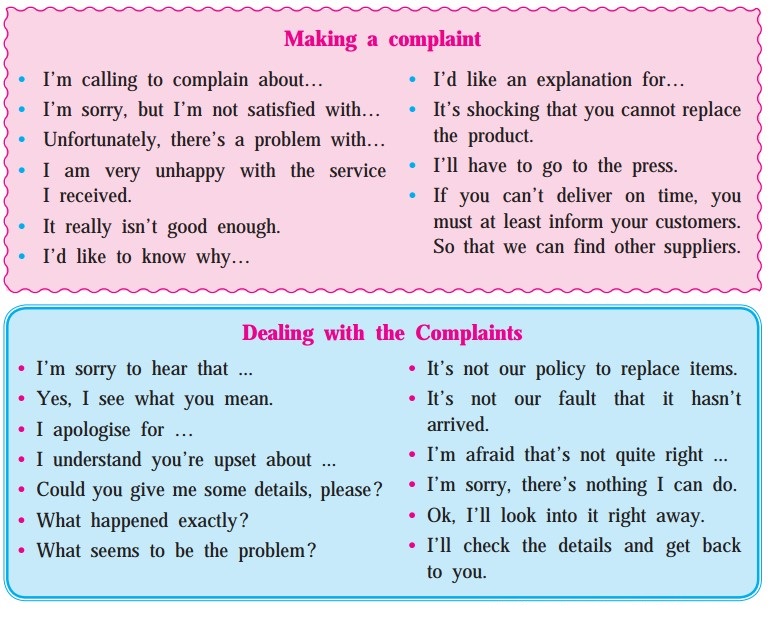
My English Coursebook 9th Class Solutions Chapter 2.3 Mark Twain Additional Important Questions and Answers
Read the following passage and do the activities:
Simple Factual Activities:
Question 1.
Complete the following sentences with the help of the given passage:
(Answers are directly given.)
Answer:
- The real name of Mark Twain was Samuel Langhorne Clemens.
- Mark Twain went to a local barber shop for a shave.
- Many anecdotes related to Mark Twain are told and enjoyed even today.
- The young Mark Twain ran over early to say goodbye to Mrs. Stowe.
Question 2.
Name the following:
Answer:
- The popular American Writer – Mark Twain
- The place where Mrs Stowe was going – Florida
- The home country of Mark Twain – America
- The person who was going to Florida – Mrs Stowe
Question 3.
Answer the following in words :
Answer:
- How many times did Mark Twain hear the story. – Three times
- Who was telling the story? – Henry Irving
Question 4.
Complete the following sentences :
(Answers are directly given.)
Answer:
1. Henry Irving asked Mark Twain if he had heard the story before “because he wanted to assure that he had not heard the story which he was telling him.”
2. Mark Twain could not lie the third time at any cost because he had not only heard the story but also invented it after hearing it for the third time.
Question 5.
State whether the following statements are True or False: (Answers are directly given.)
Answer:
- Mark Twain received a letter from the editor of a small Missouri newspaper. – False
- Finding a spider in a paper is good luck for the reader according to Mark Twain. – False
- Mark Twain’s birth was heralded by the return of Halley’s comet. – True
- Mark Twain died in November 1835. – False
Complex Factual Activities:
Question 1.
Describe Mark Twain.
Answer:
Mark Twain was a popular American writer who was famous for his humorous stories, novels and other writings. Many anecdotes related to Mark Twain are told and enjoyed even today. He was a great defender of human values like liberty, equality and fraternity.
Question 2.
Complete the following web describing Mark Twain:
(Answers are directly given.)
Answer:
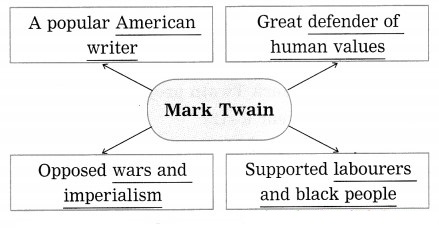
Question 3.
Complete the following:
(Answers are directly given.) The two social activities that Mark Twain supported:
1. Being a great defender of human values like liberty, equality and fraternity, Mark Twain opposed wars and imperialism.
2. He also supported the cause of labourers and of the black people in his country.
Question 4.
Was Twain particular about what words he used?
Answer:
Yes, Twain was very much particular about what words he used.
Question 5.
Why was Henry Irving asking Mark Twain the same question again and again?
Answer:
While telling a humorous story to Mark Twain, Henry Irving noticed his friend’s face. He noticed some unknown gestures on his face. Thinking, he might have heard the story, Henry was reassuring whether Mark Twain had heard the story or not so to make it sure he was asking the same question again and again.
Question 6.
What did Mark Twain propose? What was his plan at the year 6-12?
Answer:
Mark Twain proposed a plan for the improvement of English Spelling. At the year 6-12 his plan was modifying vowels and the remaining voiced and unvoiced consonants.
Question 7.
How did Twain explain the spider in the paper? What did he want to highlight?
Answer:
1. Twain explained that the spider was on the paper to see which merchant was not advertising, so that he could go to that store spin his web across the door and lead a life of undisturbed peace afterwards.
2. He wanted to highlight that there was no logical reason behind superstitions as the spider just happened to be there on the newspaper by chance. He also wanted to highlight that we should not believe in superstitions.
Question 8.
Which episode shows that Mark Twain did not believe in superstitions?
Answer:
A letter was received by Mark Twain from a reader asking him whether finding a spider in his j paper portended good or bad luck. His reply to the reader shows that he did not believe in superstitions, whereas we should take such situations humorously.
Activities based on vocabulary:
Question 1.
Find out similar meaning words (synonyms) for the following from the passage :
(Answers are directly given.)
Answer:
- freedom – liberty
- protector – defender
- brotherhood – fraternity
- considered – regarded
Question 2.
Complete the following word-web with the words related to literature:
(Answers are directly given.)
Answer:
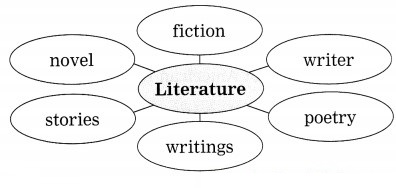
Question 3.
Find out any four wrongly spelled words and correct them:
Answer:
- Iear – Year
- konsonant – consonant
- fainali – finally
- lojikl – logical
Question 4.
Find out from the passage the words used for the following words:
Answer:
- world – werld
- replace – riplais
- respectively – respective
- modifying – modifaiing
Question 5.
Classify the following words in the given table:
reader, remind, wonder, spider, merchant, return, declare, comet.
Answer:
Nouns | Verbs |
reader, spider, merchant, comet. | remind, wonder, return, declare. |
Activities based on contextual grammar:
Question 1.
Change the following sentences in indirect speech:
1. “You have chosen a good time to come,” the barber said to Mark Twain.
2. The barber said to Mark Twain, “Have you bought your ticket?”
Answer:
1. The barber told Mark Twain that he had chosen a good time to come.
2. The barber asked Mark Twain if he had bought his ticket.
Question 2.
Use ‘not only’ …. ‘but also’ and rewrite the sentences:
1. Many anecdotes related to Mark Twain are told and enjoyed even today.
2. Mark Twain opposed wars and imperialism.
Answer:
1. Many anecdotes related to Mark Twain are not only told but also enjoyed even today.
2. Mark Twain opposed not only wars but also imperialism.
Identify the mistakes in the following ( sentences and write the correct sentences:
Question 1.
Jenerally, then, the improvement would kontinue iear bai iear.
Answer:
Generally, then, the improvement would continue year by year.
Question 2.
it wud fainali bi possible to meik ius ov thi ( ridandant letez.
Answer:
It would finally be possible to make use of the redundant letters.
Identify the tense:
Question 1.
1. Henry Irving was telling a humorous story.
2. Mark Twain proposed a plan for the improvement of English Spelling
Answer:
1. Past Continuous Tense.
2. Simple Past Tense.
Make the sentences affirmative:
Question 1.
1. A man cannot be comfortable without his own approval.
2. Don’t be careless about reading health books.
Answer:
1. A man is (can be) uncomfortable without his own approval.
2. Be careful about reading health books.
Frame a wh-question to get the underlined part as an answer in each sentences:
Question 1.
Mark Twain received a letter from a reader.
Answer:
What did Mark Twain receive from a reader?
Question 2.
Mark Twain’s birth was heralded by the return of Halley’s comet.
Answer:
What was heralded by the return of Halley’s comet?
Personal Response:
Question 1.
What is the importance of humour in our life?
Answer:
Humour is the most effective and important ingredient, to spice up the dish of life. It is enjoyed by all irrespective of age, caste, gender, whatever. It is one thing which can bind us all and generate a positive and happy environment. Even the most difficult situations can be handled with ease, if we are armed with humorous mind and disposition.
Question 2.
What do you know about Mark Twain?
Answer:
Mark Twain, was an American writer, humorist, publisher and lecturer. He was born on 30th November, 1835 in Florida (U.S.). Twain earned a great deal of money from his humorous writings and lectures. He was lauded as the greatest American humorist of his age. The Adventures of Tom Sawyer and The Adventures of Huckleberry Finn were his two major classics of American literature.
Question 3.
Why should we avoid spelling mistakes while writing?
Answer:
Correct spelling improves the overall presentation of our work and helps with our confidence in writing. Incorrect spelling can be both embarrassing and damaging. It changes the meaning of the sentences. It also leaves a bad impression of the writer on the readers’ mind.
Question 4.
How can you improve English spellings?
Answer:
We can improve our English spellings in the following ways:
- By learning a few rules of forming words.
- By learning commonly misspelled words.
- By checking word origins in the dictionary.
- By separating words into chunks.
- By using the words in its context.
- By playing word games/solving puzzles.
Question 5.
Why should we take part in humorous sessions?
Answer:
Jokes can make people laugh and this impacts the blood circulation. Humorous sessions are often considered as good time for individuals with heart and other cardiovascular problems. It indirectly improves immune system by increasing infection-fighting antibodies. It reduces pains and takes us out from our problems.
Activities Based on Language study
Do as directed:
Question 1.
Complete the words by using correct letters:
- t o _ a y
- s _ a v e
- a _ a i n
- p _ i c e
Answer:
- t o d a y
- s h a v e
- a g a i n
- p r i c e.
Question 2.
Copy the following sentences correctly:
Answer:
1. “Have you bought your ticket yet?”
2. “You’ve chosen a good time to come,” he declared.
Question 3.
Put the following words In alphabetical order:
1. reader, spider, merchant, honour.
2. careless, classic, curiosity, cosmically.
Answer:
1. honour, merchant, reader, spider.
2. careless, classic, cosmically, curiosity.
Question 4.
Punctuate the following sentences:
1. are you quite sure you havent heard this he demanded suspiciously.
2. i not only heard the story invented it said mark twain.
Answer:
1. “Are you quite sure you haven’t heard this?” he demanded suspiciously.
2. “1 not only heard the story, I invented It!” said Mark Twain.
Question 5.
Write four small words (minimum 3 letters each) using the letters in the given word:
‘generalizations’
Answer:
- general
- gents
- ration
- lion.
Question 6.
Spot the error and rewrite the correct sentences:
1. A man does not be comfortable without his own approval.
2. Mark Twain will oppose wars and imperialism and supported the cause of labourers.
Answer:
1. A man cannot be comfortable without his own approval.
2. Mark Twain opposed wars and imperialism and supported the cause of labourers.
Question 7.
Write related words as shown in the example:
(Answers are directly given.)
Answer:
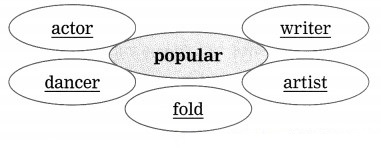
Question 8.
Complete the following word-chain of verbs. Add four words, each beginning with the last letter of the previous word:
find → ……………… → ……………. → …………….. → ……………… .
Answer:
find → drink → keep → play → yell.
Do as directed:
Question 1.
Make your own meaningful sentence by using the phrase ‘to wait for’.
Answer:
We should always wait for the right opportunity.
Question 2.
Add a prefix or suffix to make new words and use one of the root words in your own sentence:
1. advantage
2. agree.
Answer:
1. disadvantage
2. disagree.
Sentence: There are many advantages of reading good books.
Question 3.
Add a clause to expand the sentence meaningfully:
I bought a new mobile …………………. .
Answer:
I bought a new mobile which is not at all useful for me.
Activities:
Question 1.
Can you think of other examples of irregularities in English spelling?
(Few examples are given here. Students may think and write other examples.)
Answer:
- Name – Nikki, Nicky, Toni & Tony
- – centre, center
- – weight, height
- – headache, know
Question 2.
Write a few sentences according to the improvements suggested for each year:
Answer:
Year | Sentences | Suggested improvements |
1 | I never drink cool water. | I never drink kool water. |
2 | She baked one cake. | She baked won kake. |
3 | He replied angrily. | He replied angrili. |
5 | Finally, she stopped overeating. | Finali she stoped overeeting. |
6 to 12 | It would be nice to eat peanuts. | It wud bi naise tu eet peenats. |
15 | the shop was shut. | Xe yop was yut. |
20 | This has to change soon. | Xis has tu ccej sun. |